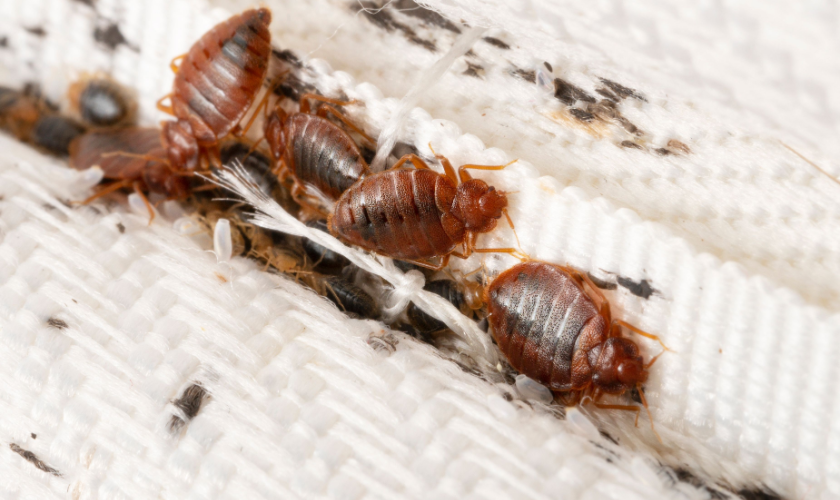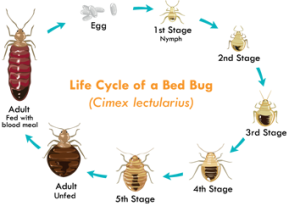Ideal Kings Bug Control Cincinnati: Premier Pest Control Experts
Ideal Kings Bug Control Cincinnati: Premier Pest Control Experts
Blog Article
Types of Insect Control: Which Approach Is Right for Your Infestation?
When faced with a parasite infestation, the option of an appropriate technique for pest control is vital in effectively handling the scenario. By exploring the different kinds of insect control techniques readily available, individuals can make educated choices tailored to their distinct scenarios, ensuring a much more lasting and reliable result in parasite eradication.
Chemical Insect Control
Chemical bug control entails making use of synthetic or naturally acquired chemicals to take care of and eradicate pest populations efficiently. This technique is commonly made use of in farming, forestry, and residential settings to fight a wide variety of parasites, consisting of weeds, rodents, and insects. The use of chemical pesticides can provide quick and targeted services to pest infestations, making it a popular choice for numerous individuals and companies.
One of the key advantages of chemical pest control is its ability to promptly remove parasites, lowering the threat of damages to crops, property, and human wellness. By making use of details chemicals that target specific insects, this method can efficiently control problems while decreasing harm to useful microorganisms and the setting when used appropriately.
Nonetheless, using chemical insect control also elevates worries regarding potential damaging impacts on non-target types, water sources, and human wellness. It is vital to comply with safety standards, apply chemicals sensibly, and think about alternative parasite control techniques to minimize these threats and guarantee sustainable parasite administration practices.
Organic Insect Control
Organic insect control, also called biocontrol, utilizes living microorganisms to manage and minimize insect populaces naturally. This technique harnesses the power of nature to regulate pests without the requirement for synthetic chemicals. Biocontrol can involve the introduction of all-natural enemies of the bug species, such as parasites, virus, or predators, to suppress insect populaces. By utilizing the insect's all-natural killers or pathogens, biological bug control supplies a lasting and environmentally friendly option to pest monitoring.

Mechanical Pest Control
Making use of physical and hands-on techniques to handle insect populaces, mechanical insect control offers a different method that does not rely upon making use of living organisms or artificial chemicals. This method includes using obstacles, catches, or other tools to physically hinder or get rid of parasites. By blocking parasite entry factors or setting up catches to capture them, mechanical insect control can properly decrease problems without introducing chemicals into the setting.
One common instance of mechanical parasite control is the use of mesh displays on doors and windows to stop insects from going into structures. This simple yet efficient approach acts as a physical barrier, maintaining pests out while enabling appropriate air flow. Additionally, gadgets like mousetraps, fly swatters, and ultrasonic repellents fall under the mechanical insect control group.
While mechanical bug control techniques can be labor-intensive and need routine monitoring and maintenance, they use a lasting and environmentally friendly solution for managing insect invasions. By incorporating various mechanical strategies, home proprietors can create an extensive insect control method that decreases dependence on chemical pesticides.
Physical Parasite Control

Some common physical bug control methods consist of making use of obstacles such as screens or internet to stop bug entry, traps to record and eliminate parasites, and hand-picking to physically get rid of insects from plants or frameworks. Additionally, methods like warmth treatments can be made use of to control bugs like bed pests by increasing the temperature level to levels that are deadly to the pests.
Physical pest control is especially valuable in integrated bug monitoring (IPM) techniques, where several parasite control methods are integrated for have a peek at these guys reliable pest administration while decreasing using chemicals. By using physical bug control strategies, individuals can efficiently attend to parasite infestations with minimal environmental effect.
Integrated Bug Management
When carrying out physical parasite control approaches as part of pest administration methods, Integrated Parasite Monitoring (IPM) emerges as an extensive method that leverages different methods to successfully regulate pest populaces. IPM concentrates on lasting avoidance of parasites via a mix of organic, social, physical, and chemical devices customized to certain bug concerns. By incorporating this link several control techniques, IPM intends to lessen the dangers connected with insects while likewise decreasing reliance on chemical solutions.
One key facet of IPM is the focus on tracking and examining pest populations to identify the most appropriate control approaches. This aggressive technique permits early treatment and targeted methods, causing a lot more efficient bug administration. Additionally, IPM advertises eco friendly practices by focusing on non-chemical control techniques and only making use of chemicals as a last resource.
Conclusion

By utilizing the insect's natural predators or microorganisms, organic parasite control provides a sustainable and environmentally friendly remedy to pest monitoring. - Kings cincinnati pest control
Making use of physical and hand-operated techniques to handle insect populaces, mechanical parasite control uses an alternate approach that does not count on the usage of living organisms or artificial chemicals.An efficient method to taking care of bug populations without counting on chemical or organic methods entails the use of physical pest control strategies.When carrying out physical pest control approaches as part of parasite administration strategies, Integrated Parasite Administration (IPM) arises as a detailed approach that leverages numerous methods to effectively manage pest populations. Chemical bug control involves the usage of pesticides, biological parasite control uses all-natural predators, mechanical parasite control involves physical obstacles, physical insect control consists of trapping or getting rid of insects, and incorporated insect management incorporates multiple techniques for a holistic method to pest control.
Report this page